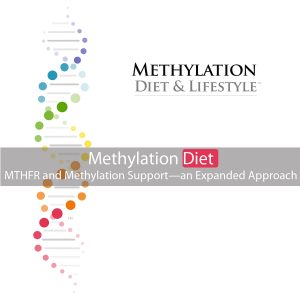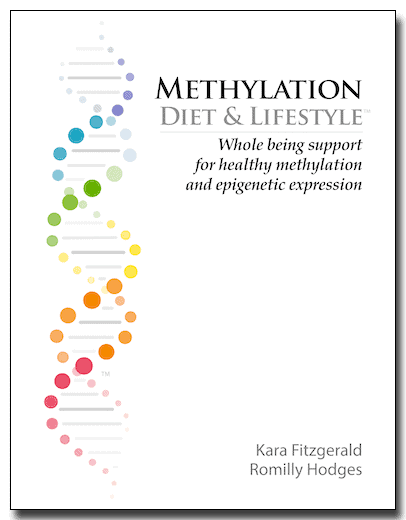I’m thrilled to announce the launch of Kara Fitzgerald and Romilly Hodges’ new book the “Methylation Diet and Lifestyle.” Methylation is a topic we cover extensively in our Advanced Practitioner training program at the BioIndividual Nutrition Institute. I’ve admired Kara Fitzgerald’s work for over 8 years. She’s brilliant at understanding the biochemistry of the body and the importance of nutrients and food. When I learned that she came out with a new book recently on the Methylation Diet, I knew this topic was PERFECT for our BioIndividual Nutrition members. Here’s the article Kara and Romilly wrote for us, as well as more on their book and a webinar training session we will be doing in August…

The Methylation Diet: MTHFR and Methylation Support—an Expanded Approach
by Kara Fitzgerald and Romilly Hodges
This is a must-read for anyone who knows they have an MTHFR, or other methylation-related, gene polymorphism or is at risk for hypomethylation-related conditions including autism.
The Importance of Methylation
Methylation is such a fundamental process that each of our cells is continually using for many, many activities, ranging from cell division, immune cell formation, creating neurotransmitters, detoxification, and hormone metabolism, to regulating even
how our genes get expressed.
Tools to Support Methylation
Food Choices
What does this look like? To start with, we look at sources of nutrients. Of course nutrients have a key role to play, but we can also get nutrients from food based sources, not just supplements. We specifically designed our Food Plans, Menu Plans and recipes to be rich in methylation nutrients, and compatible with other commonly-used dietary programs such as gluten-free and dairy-free.
Support the Microbiome
We can also support nutrient status through the microbiome. Those little guys in our gut actually have a really important role to play in synthesizing nutrients for us, including B vitamins such as folate.
Avoid Nutrient and Methyl Depletors
Another way to support nutrient and methylation status is to minimize factors that actually
deplete nutrients and methyl donors. This is a really important concept, termed ‘methyl donor drain’.
Methylation Balance
Beyond nutrients, it is really important to identify and implement those techniques that help promote methylation
balance in the body.
Inflammation and Additional Factors
These are some, but by no means all, of the concepts that we’ve incorporated into our program; we also work on inflammation, oxidative stress, mitochondrial fitness, sleep, exercise, environmental toxins, medication effects, dietary patterns and macronutrient ratios, meal timing and more.

To find out exactly how these factors influence methylation and how to apply them for a holistic approach to methylation support, check out Kara Fitzgerald and Romilly Hodges’ eBook, available at
www.drkarafitzgerald.com/practitioners/eBook.
Use the following code for a 10% discount on Methylation Diet and Lifestyle: BNI10
Get the replay for the webinar on the Methylation Diet at: http://bioindividualnutrition.com/the-methylation-diet-webinar/
This is an excerpt from BioIndividualNutrition.com. You can find the full article
HERE, where you can see charts and diagrams, details about the tools to support methylation, meet the authors, as well as get the e-book and join a webinar.

 To find out exactly how these factors influence methylation and how to apply them for a holistic approach to methylation support, check out Kara Fitzgerald and Romilly Hodges’ eBook, available at www.drkarafitzgerald.com/practitioners/eBook.
Use the following code for a 10% discount on Methylation Diet and Lifestyle: BNI10
Get the replay for the webinar on the Methylation Diet at: http://bioindividualnutrition.com/the-methylation-diet-webinar/
This is an excerpt from BioIndividualNutrition.com. You can find the full article HERE, where you can see charts and diagrams, details about the tools to support methylation, meet the authors, as well as get the e-book and join a webinar.
To find out exactly how these factors influence methylation and how to apply them for a holistic approach to methylation support, check out Kara Fitzgerald and Romilly Hodges’ eBook, available at www.drkarafitzgerald.com/practitioners/eBook.
Use the following code for a 10% discount on Methylation Diet and Lifestyle: BNI10
Get the replay for the webinar on the Methylation Diet at: http://bioindividualnutrition.com/the-methylation-diet-webinar/
This is an excerpt from BioIndividualNutrition.com. You can find the full article HERE, where you can see charts and diagrams, details about the tools to support methylation, meet the authors, as well as get the e-book and join a webinar.



Hi,
This confuses me. I’ve bought the methylation diet E-book. And the recommended foods are almost all high oxalate foods. Like spinach, Beets, cocoa, buckwheat….
The methylation diet is much easier to follow, because it allows a wider range of foods. The LOX diet is much more difficult. Can you combine these 2diets and still have a healthy diet? My Son is now on the BED , and i try to incorporaties as many foods of the methylation diet as possible.
Cindy, from Belgium, Europe